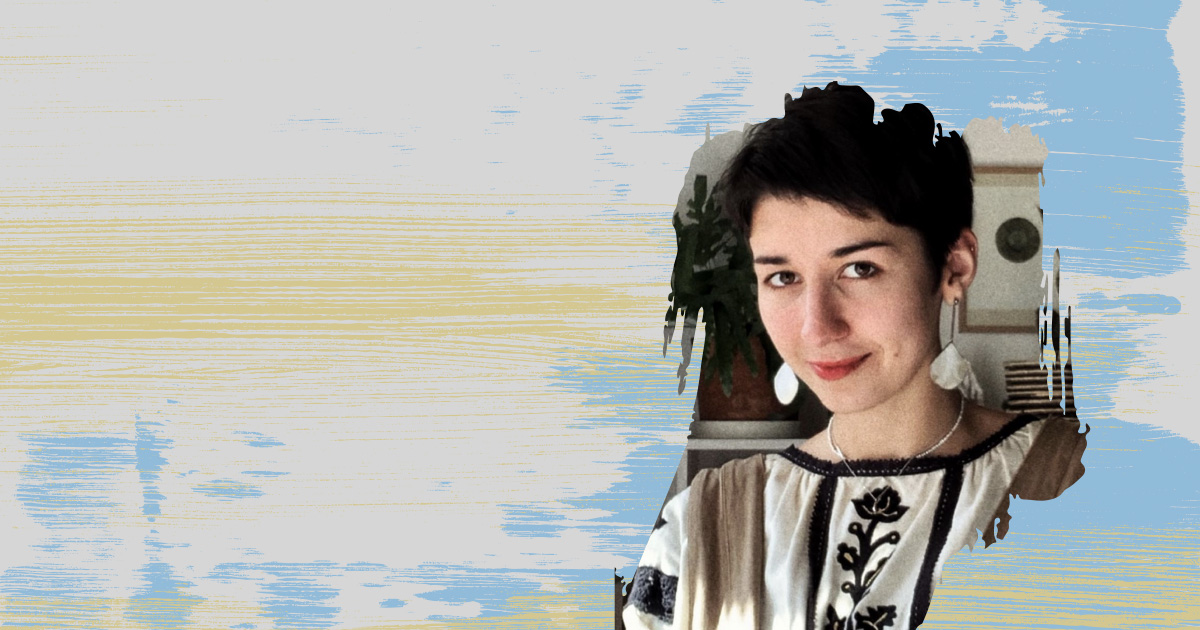Artists Against War: The Visual Language of War. An Interview with Sophia Suliy

Svidomi in collaboration with Artists Against War, an online gallery of posters created to support Ukraine after the Russian full-scale invasion, tell the stories of the artists who help Ukraine by means of art. Read an interview with the illustrator Sophia Suliy.
— What did you do before February 24?
— I work at the Lviv Ivan Trush College of Decorative and Applied Arts, and I am also a freelance illustrator. Therefore, I cannot say that my activities have changed, it’s just more of them now, and their subject has changed.
— Can you describe your day of February 24?
— I had a lot of plans for February 24: for the first time in my life, I had to fix some issues at the tax office, I had a lot of work plans — but in the morning, somewhen around five or half past five in the morning, I got a message in my college work chat and read that the classes had been cancelled due to certain circumstances, but the circumstances weren’t specified. I didn't hear any explosions in my area, but when I opened my Facebook feed, the blood chilled in me. The first post I came across was by a psychologist, saying "it has started". A few words, but everything inside me grew numb. And I was scrolling and scrolling; the people whom I know were writing the details: what, where, and how. My first reaction was shock; then I quickly went to the store. My go-bag wasn’t packed. As if I was waiting for this, but didn’t want to believe that it would actually begin. The first day passed in anxiety, calling to my relatives, discussing what we were going to do. We planned to stay as long as possible, ideally — until our victory.
— Did you expect that there would be a full-scale invasion?
— I believe everyone had background anxiety. I expected that something would happen, but not a full-scale war. I didn't want to believe that the fire of the war would spread to all cities. I just couldn’t find a logical justification, "for what?".
— What do you do now?
— In the first 3 or 4 days, I had the feeling that what I was doing, that the profession I had chosen — that all this was absolutely useless, that now some other skills would be of use. I tried to do some volunteering, I was constantly engaged in humanitarian aid. Over time, I realised that the media space is also important, that you need to work and do what you do best. That's how I started creating illustrations, just reflecting on the subject. People shared them, and I got some orders. Now, there are some charitable NFT collections, there are some new platforms where posters are sold, and part of the proceeds are donated to the Come Back Alive fund and other verified funds.
I also draw illustrations for the Local History journal, for the European Union in Ukraine Instagram page. There are many of them, but they are small, and because of this I feel loaded with work. During the war, I have accumulated a lot of illustrative material, and I already have the base that I just send out.
There is a BlackPack brand that has now switched from making backpacks and belt bags to making some things that are useful at the frontline. They launched a Victory Bag, a belt bag for which some other other illustrators and I designed a print and made a mockup. In short, there are a lot of initiatives now, everyone is trying to cooperate, and this inspires.
— And what about creativity? Does it serve as a reflection now?
— It has always been important for me to leave room for self-reflection. This is what resonates most with people — frankness and feelings, experiences. Most of my illustrations were created because I felt like creating them. Most of them are my reflections on the events that are happening, and it helps to cope with the stress. I am already tracing and I can see that in the first week I was creating and still trying to communicate with the "Russians", i.e., in the first week there was — not hope — but angry communication. Then there was simply the recording of various violent newsmaking stories: the Mariupol maternity hospital, the girl who died from dehydration under the rubble in Mariupol — I wanted to record all the cruel and painful stories.
— Do you think that art is now yet another frontline in this war?
— Art is always important. It is a way to communicate with people, to sow ideas, to support, to show compassion or express disagreement. So yes, art is necessary. Especially now that we consume visual and information content as a constant stream. If in the first weeks of the war there was a feeling that I was wasting the time, that I could have done more, now there is a feeling that I am in the exact place where I need to be.


